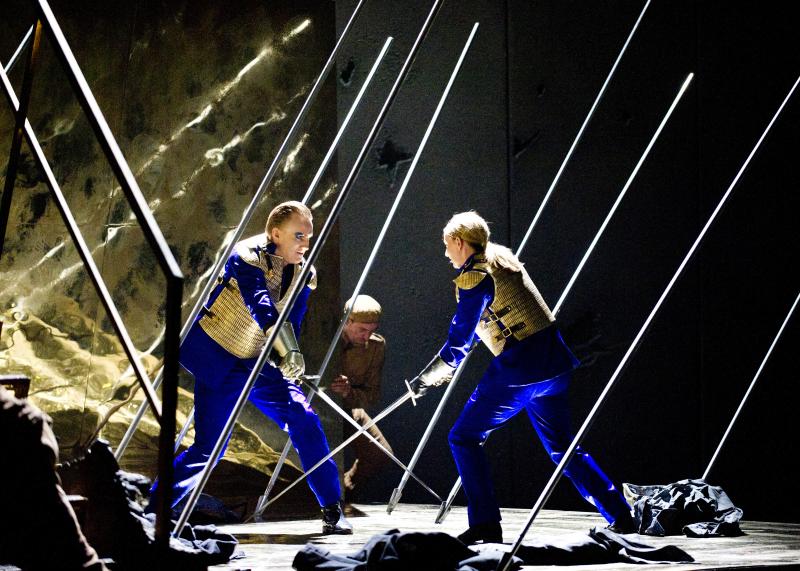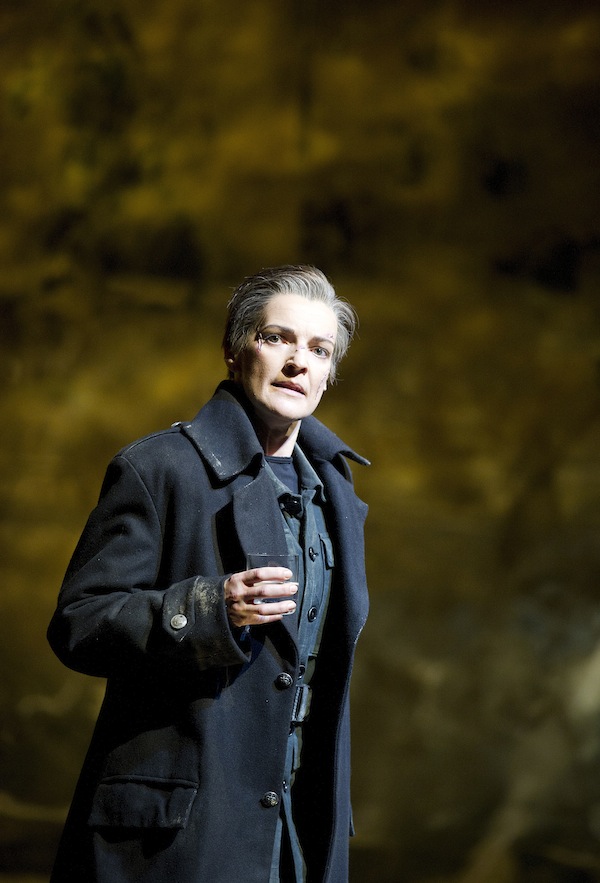Giulio Cesare in Egitto, Opera North | reviews, news & interviews
Giulio Cesare in Egitto, Opera North
Giulio Cesare in Egitto, Opera North
Neat direction and outstanding singing ensure that Albery's Handel succeeds

It’s the pace that takes getting used to in a Baroque opera. Five words in the libretto can easily take up five minutes to sing, and Handel’s music is often disconcertingly jaunty, even when tragic events are unfolding. Tim Albery has also directed Opera North’s current Madam Butterfly revival, a thrillingly cinematic, fast-moving production. His Giulio Cesare is judiciously pruned, with a total running time of about three hours.
Albery’s 20th-century update is dominated Leslie Travers’s brutalist concrete barrier, enclosing a pyramid shape which can be revolved – the exterior harsh and grey, the interior bronzed, golden. There’s a lot of scope for shadowy lurking, notably as the production opens and Giulio Cesare’s rival Pompeo is cleanly, nastily dispatched by Tolomeo, the Egyptian King. Countertenor James Laing's Tolomeo steals the evening, even attracting pantomime-style boos at the curtain call. He’s slightly comic, camply attired (he and his sister/wife Cleopatra are the only characters dressed in bright colours) and finally loathsome, the golden fingernail extensions he wears at one point deliciously suggesting petty cruelty and sadism.
 Cleopatra, beautifully sung by Sarah Tynan, is a brilliant match for him, physically and vocally – she’s not an eyeliner-streaked Liz Taylor clone but small and blonde. Initially we’re slightly repelled by her shallow vanity, particularly when she sits on the steps and seductively unrolls her stockings, flippantly tossing them aside. Tynan’s sheer stamina is a revelation; Handel’s protracted arias never sound strained, even when she’s been chained by one leg to the stage floor. You’ve fallen in love with her by the time the opera reaches its climax, despite the fact that she’s played a pretty passive role in the events leading up to her union with Cesare, soberly and impressively portrayed by Pamela Helen Stephen (pictured above right).
Cleopatra, beautifully sung by Sarah Tynan, is a brilliant match for him, physically and vocally – she’s not an eyeliner-streaked Liz Taylor clone but small and blonde. Initially we’re slightly repelled by her shallow vanity, particularly when she sits on the steps and seductively unrolls her stockings, flippantly tossing them aside. Tynan’s sheer stamina is a revelation; Handel’s protracted arias never sound strained, even when she’s been chained by one leg to the stage floor. You’ve fallen in love with her by the time the opera reaches its climax, despite the fact that she’s played a pretty passive role in the events leading up to her union with Cesare, soberly and impressively portrayed by Pamela Helen Stephen (pictured above right).
The most impressive singing comes from Ann Taylor and Kathryn Rudge as Cornelia and Sesto, the murdered Pompeo’s widow and daughter; their duet in Act 1 is marvellous, the two voices beautifully matched. Sesto finally succeeds in murdering Tolomeo, who’s then left painfully suspended by his ankles. At which point the set does one of its periodic revolves, enabling Laing to be untied before his circulatory system has given up. Cesare, earlier thought to have drowned, reappears and declares his love for Cleopatra, the new Queen of Egypt. Alas, she now dons her deceased brother’s fingernails, implying that her reign won’t be any more enlightened than his was.
Robert Howarth makes his company debut, playing harpsichord continuo and confidently directing slimmed-down orchestral forces. Cesare’s aria Va tacito includes a virtuosic horn obbligato, while the entry of the full horn quartet near the opera’s close is a spectacular moment. Thomas C Hase’s lighting neatly conveys the feeling of darkness, of intrigue, while always allowing us to see just enough. But it’s the quality of the singing which makes any opera worth seeing, and the singing in this production is consistently impressive.
- Giulio Cesare in Egitto at Leeds Grand Theatre (25 January, 7, 10, 16 February), Theatre Royal Nottingham (23 February), The Lowry Salford (1 March), Theatre Royal Newcastle (9 March) and Grand Canal Theatre Dublin (14-16 March)
Explore topics
Share this article
The future of Arts Journalism
You can stop theartsdesk.com closing!
We urgently need financing to survive. Our fundraising drive has thus far raised £33,000 but we need to reach £100,000 or we will be forced to close. Please contribute here: https://gofund.me/c3f6033d
And if you can forward this information to anyone who might assist, we’d be grateful.

Subscribe to theartsdesk.com
Thank you for continuing to read our work on theartsdesk.com. For unlimited access to every article in its entirety, including our archive of more than 15,000 pieces, we're asking for £5 per month or £40 per year. We feel it's a very good deal, and hope you do too.
To take a subscription now simply click here.
And if you're looking for that extra gift for a friend or family member, why not treat them to a theartsdesk.com gift subscription?
more Opera
 Help to give theartsdesk a future!
Support our GoFundMe appeal
Help to give theartsdesk a future!
Support our GoFundMe appeal
 Tales of Apollo and Hercules, London Handel Festival review - compelling elements, but a failed experiment
Conceptually the two cantatas just don't work together
Tales of Apollo and Hercules, London Handel Festival review - compelling elements, but a failed experiment
Conceptually the two cantatas just don't work together
 La finta giardiniera, The Mozartists, Cadogan Hall review - blooms in the wild garden
Mozart's rambling early opera can still smell sweet
La finta giardiniera, The Mozartists, Cadogan Hall review - blooms in the wild garden
Mozart's rambling early opera can still smell sweet
 Der fliegende Holländer, Irish National Opera review - sailing to nowhere
Plenty of strong singing and playing, but the staging is static or inept
Der fliegende Holländer, Irish National Opera review - sailing to nowhere
Plenty of strong singing and playing, but the staging is static or inept
 Die Zauberflöte, Royal Academy of Music review - first-rate youth makes for a moving experience
The production takes time to match Mozart's depths, but gets there halfway through
Die Zauberflöte, Royal Academy of Music review - first-rate youth makes for a moving experience
The production takes time to match Mozart's depths, but gets there halfway through
 Mansfield Park, Guildhall School review - fun when frothy, chugging in romantic entanglements
Jonathan Dove’s strip-cartoon Jane Austen works well as a showcase for students
Mansfield Park, Guildhall School review - fun when frothy, chugging in romantic entanglements
Jonathan Dove’s strip-cartoon Jane Austen works well as a showcase for students
 Uprising, Glyndebourne review - didactic community opera superbly performed
Jonathan Dove and April De Angelis go for the obvious, but this is still a rewarding project
Uprising, Glyndebourne review - didactic community opera superbly performed
Jonathan Dove and April De Angelis go for the obvious, but this is still a rewarding project
 Fledermaus, Irish National Opera review - sex, please, we're Viennese/American/Russian/Irish
Vivacious company makes the party buzz, does what it can around it
Fledermaus, Irish National Opera review - sex, please, we're Viennese/American/Russian/Irish
Vivacious company makes the party buzz, does what it can around it
 The Capulets and the Montagues, English Touring Opera review - the wise guys are singing like canaries
There's a bel canto feast when Bellini joins the Mob
The Capulets and the Montagues, English Touring Opera review - the wise guys are singing like canaries
There's a bel canto feast when Bellini joins the Mob
 Mary, Queen of Scots, English National Opera review - heroic effort for an overcooked history lesson
Heidi Stober delivers as beleaguered regent, but Thea Musgrave's opera is limiting
Mary, Queen of Scots, English National Opera review - heroic effort for an overcooked history lesson
Heidi Stober delivers as beleaguered regent, but Thea Musgrave's opera is limiting
 Festen, Royal Opera review - firing on every front
No slack in Mark-Anthony Turnage's operatic treatment of the visceral first Dogme film
Festen, Royal Opera review - firing on every front
No slack in Mark-Anthony Turnage's operatic treatment of the visceral first Dogme film
 Phaedra + Minotaur, Royal Ballet and Opera, Linbury Theatre review - a double dose of Greek myth
Opera and dance companies share a theme in this terse but affecting double bill
Phaedra + Minotaur, Royal Ballet and Opera, Linbury Theatre review - a double dose of Greek myth
Opera and dance companies share a theme in this terse but affecting double bill

Add comment